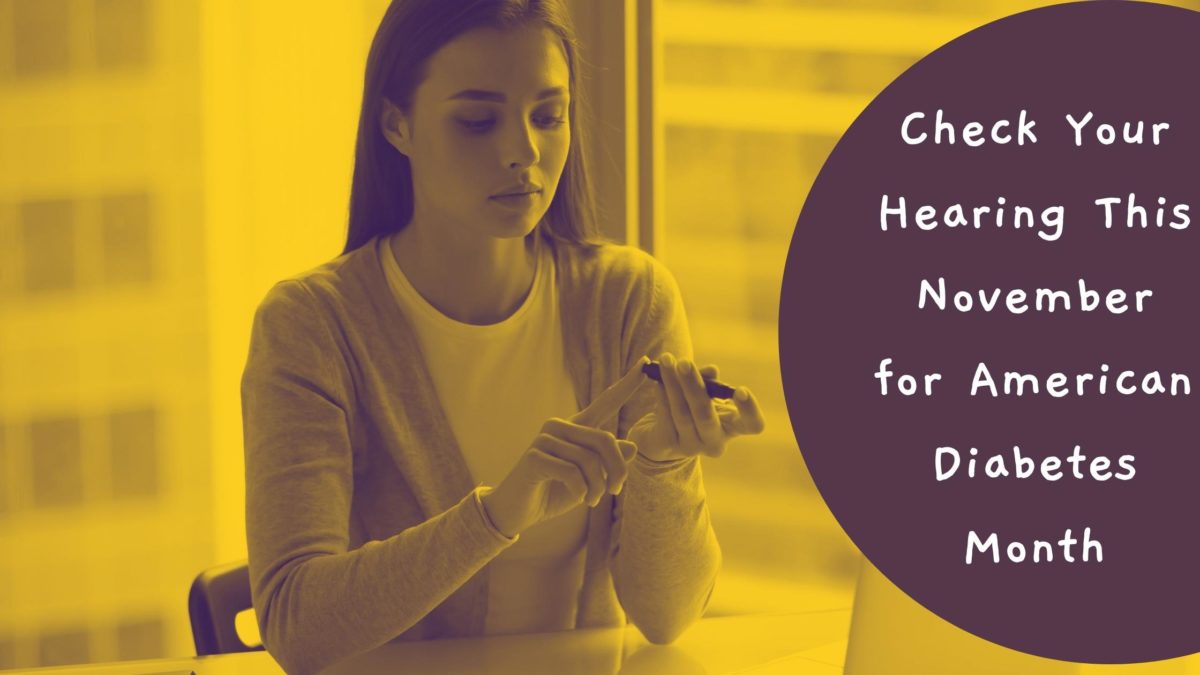- Are Cochlear Implants Worth It? - June 6, 2025
- Tips for Using Hearing Aids in Different Environments - May 27, 2025
- Rechargeable Hearing Aids vs. Battery-operated Hearing Aids - May 16, 2025
Did you know that this month is American Diabetes Month? Over 34 million people in the U.S. have diabetes, a chronic condition that impacts how the body turns food into energy. Diabetes can increase the risk of developing other health conditions including hearing loss. A recent study shows that people with diabetes can be twice as likely to also experience hearing loss. If you have diabetes or prediabetes, it is especially important to have your hearing checked. This month is a great time to take action that prioritizes your health!
How Does Diabetes Impact Hearing?
Research highlights a link between diabetes and hearing loss. This includes a recent study conducted by researchers at the National Institutes of Health. Researchers analyzed data from a national health survey that included results from hearing tests and a diabetes questionnaire for 11,405 participants, ages 20-69. The study found that among people with diabetes:
- 54% had high-frequency hearing loss compared to 32% among people without diabetes.
- 21% had mid-frequency hearing loss compared to 9% among people without diabetes.
These findings reveal a significant correlation between both conditions. Experts suggest that diabetes, known to damage blood vessels, can damage the blood vessels in the inner ear. The inner ear helps process incoming sound waves by converting them into electrical signals that are then sent to the brain. Restricted blood vessels can disrupt this process, causing irreparable damage that produces a hearing loss.
Understanding Hearing Loss
Nearly 48 million people have hearing loss, a permanent medical condition that reduces the capacity to perceive and process sound. Hearing loss typically happens gradually and over a longer period of time so it can take quite some time for people to realize they are experiencing changes to their hearing health. This contributes to a delay in treatment which can worsen impairment and overall health. It is important to be able to recognize the signs of hearing loss so you can intervene as early as possible. Common symptoms include:
- Tinnitus: a buzzing or ringing like noise in the ears
- Sounds are slurred or muffled or blended together
- Needing to turn up the volume on electronic devices
- Asking others to repeat themselves, speak louder or slower
- Experiencing a difficult time following a conversation, especially in environments with background noise or during conversations with multiple people
- Finding yourself lip reading to help distinguish words
- Frequently missing words during a conversation or experiencing miscommunication
These symptoms can really prevent effective communication. Strained communication often takes a toll on various aspects of life by affecting relationships, causing people to retreat socially, and contributing to anxiety and depression. It is important to practice preventative measures and be proactive about hearing health, particularly for people with diabetes.
Tips to Protect Hearing Health
There are several safety measures you can start immediately practicing to protect your hearing health. This includes:
- Schedule an appointment for a hearing test. This is the first step in addressing hearing loss. Hearing tests are facilitated by a hearing healthcare provider, like an audiologist, who specializes in diagnosing and treating issues related to hearing and balance. Hearing tests involve a painless process that measures hearing capacity in both ears. This identifies any hearing loss, the specific type, and the degree of impairment you could be experiencing. Hearing tests establish your hearing needs and allow your hearing healthcare provider to recommend treatment options that can alleviate symptoms and maximize hearing capacity.
- Reduce your exposure to loud noise. Loud noise is a major cause of hearing loss. Practicing ways to limit your exposure is a useful way to reduce your risk. A few ways you can do this are to avoid settings with background noise, maintain low volume settings on electronic devices, and wear hearing protection.
- Invest in hearing protection. Wearing hearing protection like headphones, earplugs, or earmuffs create a barrier for the ears. This reduces the impact and amount of loud noise you absorb. Wearing hearing protection is especially important if you work in noisier settings, frequently move through social spaces that are louder, or commute regularly.
Call us today to schedule your appointment for a hearing test, our practice is invested in transforming your hearing health and quality of life!

